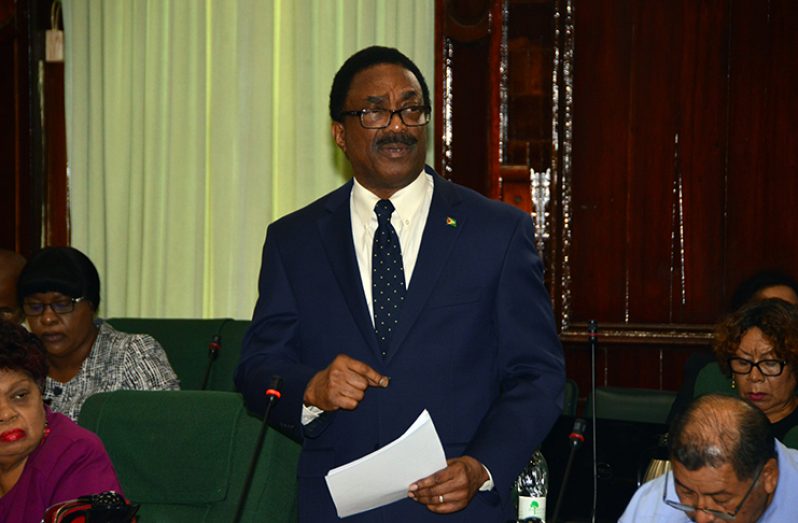— if erred in passing no-confidence motion, says AG
ATTORNEY General and Legal Affairs Minister, Basil Williams said if the Speaker of the National Assembly erred in his ruling that error can be revisited and corrected.
Williams made the proposition in a report he submitted to Cabinet in response to the no-confidence motion which was carried in the National Assembly on December 21, 2018 under the stewardship of the Speaker, Dr. Barton Scotland.
It is believed that the Speaker may have erred when he declared that the motion was carried after 33 members of the National Assembly voted in favour of it and 32 against.
In the report which was leaked to the Guyana Chronicle, the Attorney General argued that the Speaker like any other public authority is duty bound to observe the Constitution as the supreme law of Guyana.
“If therefore there is an error on the face of a ruling by the Speaker that is contrary to the Constitution, that error can be revisited and corrected by the Speaker, without the aid of parliamentary process, once he recognises his constitutional mishap,” Williams said.
It is strongly believed that there was a miscalculation of the majority of all elected members as required under Article 106(6) of the Constitution for the Government to be defeated on a vote of no-confidence. In order for the motion to be effective, the attorney general said 34 or more votes of all the elected members in favour of the motion was required instead of 33.
As such, he said the Speaker having already ruled that the motion was carried can revisit and reverse his decision on the principle that Article 106(6) was not complied with.
It was stressed that the Speaker’s rulings must be aligned with the law. “In this particular instance, the ruling has to accord with what is constitutionally required as a majority in accordance with Article 106(6),” the attorney general emphasised in his report.
In his 12-page report to the Cabinet, he also argued that if the Speaker does not reverse his decision, the Court can intervene and quash it, once it contradicts the Constitution.
“If the vote is contrary to the Constitution, the Court can intervene and quash the Speaker’s decision,” he said.
EVIDENCE
Alluding to the case of Kilman v Speaker of Parliament of the Republic of Vanuatu [2011] VUCA 15; Civil Appeal 09 of 2011 (13 May 2011), the attorney general noted that the court had declared that the vote was void and that government ministers were not to resign but remain in office because a majority was not secured.
He also pointed out that in the case of Hughes v Rogers Civil Suits No. 99 & 101 of 1999 High Court of Anguilla January 12, 2000, Justice Sanders examined several Commonwealth decisions and concluded that:
“A common thread runs through all of these cases. It is this. The Courts are entitled to inquire into the existence and extent of any privilege claimed by the House of Assembly. Moreover, the Courts will intervene where the Parliament or the Speaker has exceeded its powers, or has claimed for itself powers that it did not have, or has acted in a manner clearly, inconsistent with constitutional provision.”
CAN BE QUASHED
Williams, therefore, argued that if a Speaker acts contrary to the Constitution his decision can be quashed. “In this case the vote in Guyana is contrary to Article 106 (6) and must be set aside as being ultra vires and repugnant to the Constitution,” he emphasised.
It was noted that authority for the proposition that the Speaker ought to act constitutionally is found in the case of Economic Freedom Fighters and others v. The Speaker of the National Assembly and others [2018] 3LRC, p. 279; and Doctors for Life International v. The Speaker of the National Assemble, (Constitutional Court of South Africa, case No. 12 of 2005, unreported).
“In the case of Speaker of the Assembly v. Delille 1989, the Court of Appeal of South Africa found that Speaker had no authority under the Constitution to suspend a member of the House for an additional 15 days under the Constitution of South Africa. The respondent would therefore be entitled to an order declaring her purported suspension to be void,” the attorney general further pointed out as he built his case.
He posited that the golden thread that runs through all the cases is once the Speaker acts in manner contrary to the Constitution, the Courts are duty bound to void his decision.
Williams, in his report, said evidence suggests that there that was an error on the part of the Speaker in ruling that the vote was carried.
“The ineluctable conclusion is that the vote was improper and unconstitutional. The Constitution’s ethos and norms must be maintained in order that the Parliament do not act or purport to act in a manner subversive to the Constitution,” he stated.
It is expected that the Speaker will be asked to revisit his decision. Failure to do so would result in the matter being placed before the court.




.png)









